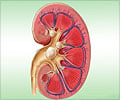Patients with Alport syndrome, researchers suggest, may be treated with several stem cell based therapies.
Most often occurring in boys, Alport syndrome causes progressive kidney disease leading to kidney failure at a young age. Patients may develop hearing loss and eye disease as well.Although treatment can slow the progression of kidney disease, there is currently no cure for Alport syndrome.
"Our study opens up many considerations of how new therapies related to the use of stem cells can be devised for our kidney patients with chronic disease," said Raghu Kalluri, from Harvard Medical School, Boston, MA.
Lead researcher Dr Valerie LeBleu, also of Harvard Medical School tested various types of cell-based therapy in mice genetically engineered to develop Alport syndrome.
The experiments have provide evidence that stem cell treatments could repair the kidney defects associated with Alport syndrome.
"We found that stem cells derived from adult bone marrow are equally useful as embryonic stem cells," said Kalluri.
Advertisement
Transplantation of bone marrow from unaffected animals significantly improved kidney function in mice in the late stages of disease. Importantly, the results suggested that the beneficial effects of bone marrow transplantation may be achieved without the need for radiation.
Advertisement
"Therefore, clinical application of this procedure is quite feasible and may help our patients immediately."
The study appears in the Journal of the American Society of Nephrology (JASN).
Source-ANI
TAN















